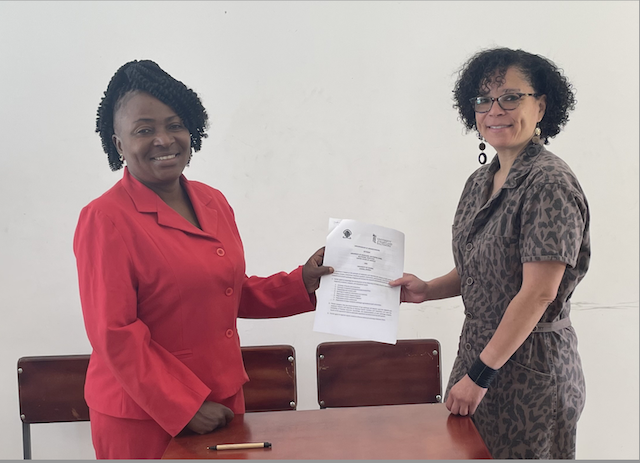UMSSW and the University of Zambia Forge Partnership to Advance Global Social Work Education
May 30, 2024 Brittney Brookins
The initiative aims to provide opportunities for students and faculty while addressing pressing public health issues in the United States and Zambia.
Photo: Patricia Mwila-Sakala of the University of Zambia and Lynn Michalopoulos of the University of Maryland School of Social Work
In a move set to redefine the landscape of global social work education, the University of Maryland School of Social Work (UMSSW) and the University of Zambia (UNZA) have signed a memorandum of understanding (MOU). This partnership promises to provide invaluable opportunities for students and faculty while addressing pressing public health issues in the United States and Zambia.
The initiative underscores the critical importance of global engagement in social work. With the world becoming increasingly interconnected, the ability to understand and address social issues across different cultural contexts is paramount. This MOU seeks to equip future social workers with the skills and perspectives needed to operate in a globalized environment, benefiting not only the universities involved but also the broader communities they serve.
One of the standout features of the partnership is its emphasis on equitable access to global opportunities. Traditional global programs often favor students who can afford to travel or who do not have personal obligations that prevent extended stays abroad. The UMB-UNZA collaboration seeks to break down these barriers by incorporating virtual exchanges, allowing a broader range of students to participate and benefit from international experiences.
Lynn Michalopoulos, PhD, MA, director of global initiatives at UMSSW, highlighted the transformative potential of this partnership. “What’s exciting to me is that students will get different ways of learning, different ways of knowing what social work looks like in different contexts,” she said. This perspective is critical, as it fosters a more comprehensive understanding of social work practices globally.
Another significant component of the partnership is the establishment of international field placements for social work students. Beginning in the 2025-2026 academic year, University of Maryland, Baltimore (UMB) students will have the opportunity to complete field placements in Zambia. This initiative aims to provide students with practical experience in addressing social issues in diverse settings, thereby enhancing their ability to operate in an increasingly globalized world.
The MOU also supports ongoing and future joint research projects, particularly those addressing public health challenges such as mental health and HIV risk among labor migrants in Zambia. According to the World Health Organization, sub-Saharan Africa carries a disproportionately high burden of disease, including 70 percent of the world's HIV cases. Collaborative efforts like this MOU are essential in developing effective interventions and policies to combat these critical health issues.
In addition to student and faculty exchanges, the partnership includes a focus on virtual exchanges. These virtual exchanges will make global opportunities more accessible, ensuring that students who cannot travel due to financial constraints or personal commitments can still benefit from international collaboration. This approach aligns with the overarching goal of the MOU to promote equitable access to global engagement.
The significance of this partnership extends beyond academic benefits. By fostering collaboration between students and faculty from varying cultural backgrounds, the MOU aims to enhance mutual understanding and respect. Understanding diverse cultural perspectives and practices is crucial in developing effective and culturally sensitive interventions.
The MOU reflects a longstanding relationship between UMB and UNZA, particularly in addressing public health issues in Zambia. The collaboration builds on years of joint research and projects, including efforts to address mental health and HIV risk among labor migrants such as truck drivers and fish traders. These populations are at higher risk for HIV due to their mobility and the associated challenges, including trauma and mental health issues. The partnership aims to develop and implement effective interventions to address these challenges, thereby improving public health outcomes.
The MOU also underscores the importance of integrating local knowledge and practices into global health initiatives. As Michalopoulos explained, “There’s value in what we understand in terms of post-traumatic stress and the ways that we do things as social workers here in the United States, but it doesn’t mean that it’s going to fit in another context. We really have to work with the populations to understand as they’re the experts, like, what’s going to work?”
This collaborative approach ensures that interventions are culturally sensitive and effective, reflecting the unique needs and practices of the local population. It also highlights the potential for mutual learning, with insights gained from Zambia potentially informing practices in the United States.
Looking ahead, the partnership between UMB and UNZA promises to yield significant benefits for students, faculty, and the broader communities they serve. By fostering a deeper understanding of social work practices across diverse cultural contexts, the MOU aims to equip future social workers with the skills and perspectives needed to address global challenges effectively. This groundbreaking initiative marks a significant step forward in global social work education, setting a precedent for other institutions to follow.